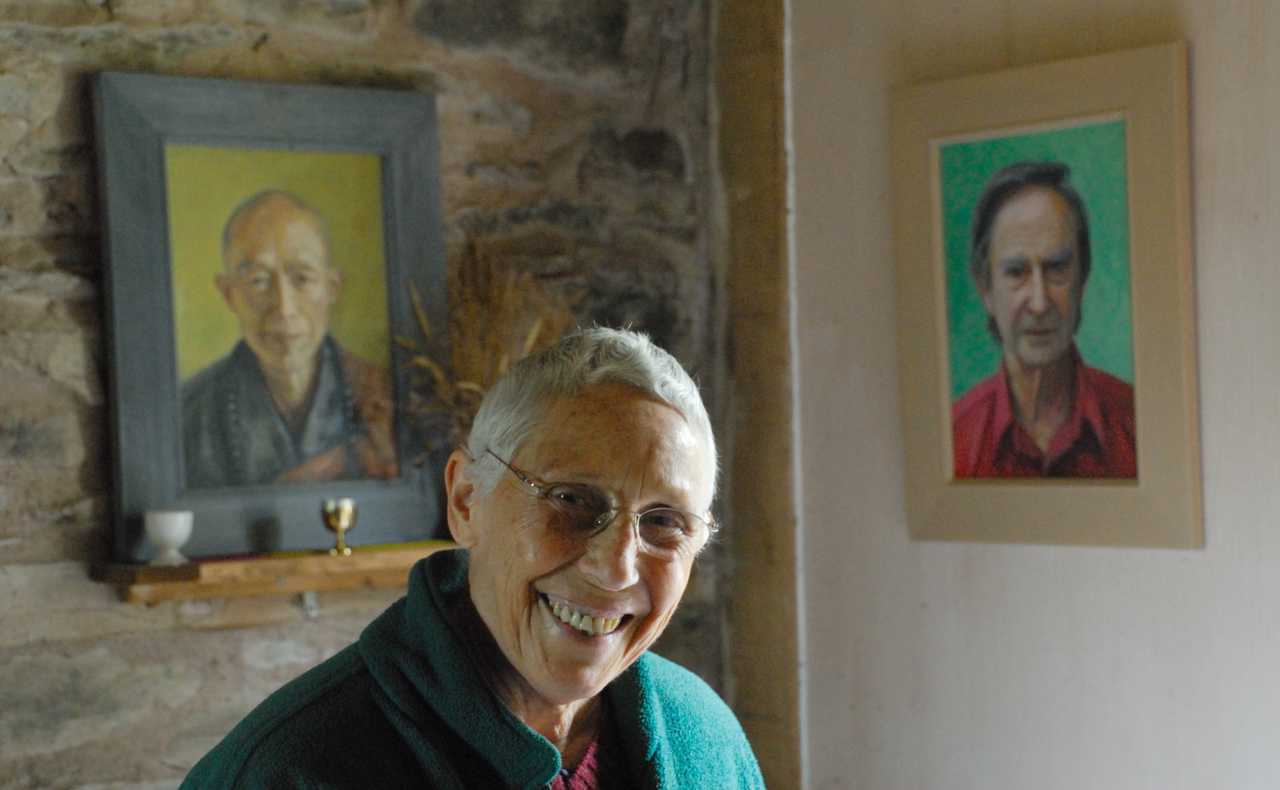Iris Tute - In Memoriam


I heard of Iris' death today with great sadness. Even though I knew Iris had suffered long and with great courage, I feel her passing to be a very personal loss and know her many friends will be feeling the same way.
I deeply regret not being with you here today; especially because I know she would have liked me to be here. I send these words as a small contribution as we remember her life together.
Iris was a deep thinking human being of unusual spiritual attainment who, through her manner of life, her career and personal expression, has given much to those who knew her. Indeed, she continued to do so throughout her long and trying illness.
I knew Iris in a number of contrasting settings: on retreats at the Maenllwyd, during our Indian pilgrimages; with George and the rest of our group at Christmas dinner in a splendid Maharaja's palace not far from the inspiring caves at Ellora; at meetings of the Bristol Chan Group and in personal encounters both in Zen interviews and more casually in her beautiful house and garden.
I did not encounter Iris in the context of her work as a therapist but I know she was not only very competent but also inspiring, able, as she was, to draw on spiritual as well as on psychological knowledge of the weaknesses to which we are all heirs. She was not afraid to experiment - exploring for example the ways of introducing children to meditation in successful, pioneering short workshops.
Travelling with Iris in India could be both amusing and instructive. She was a stickler for cleanliness at all times, be it sheets on hotel beds or the washing arrangements - the state of most Indian toilets attracting her extreme ire. This, of course was rather like looking for a vegetarian restaurant in France. On arrival at many, often highly recommended, hotels, I would soon hear her calling the manager to her room and upbraiding him in no hesitant tones, while various lackeys ran around washing and flushing with brush and disinfectant with unwonted vigour. I always hoped that future guests would benefit from her heartfelt instructions. None the less, she loved India and the fresh insights it always afforded.
Iris was one of the early participants in our Chan retreats at the Maenllwyd. She soon revealed a deep understanding of what was happening there. I participated with her in communication exercises during which her insights were often profound. On one occasion, I noted a clear white aura around her head as she spoke. I make no interpretation of this, but I was aware of the connection between its appearance to me and what she was saying at the time. Iris understood Chan Buddhist meditation very well yet her insight was such that she was by no means constrained to one approach. As a practising Quaker, she showed me how the spiritual roots of the good life are not limited to particular viewpoints but can appear in many circumstances and through many disciplines. Several times, she brought small groups of Quakers to our Chan retreats during which our common understanding was clearly evident.
We have often had Quakers coming to experience the silence we cultivate in the hills of Wales. Iris's diligent practice soon led her to a very direct understanding of the Zen practice of Silent Illumination. Hers was not so much a matter of verbal or intellectual understanding as the finding of herself in a state of joy and bliss leading into that silent emptiness from which deep compassion springs. Although we rarely discussed such experiences analytically, it was clear that her vision often took her beyond the boundaries of her personal narrative and the discrimination of time into that elusive presence of the present moment that transcends the objectivity of suffering. She felt this not only as a Zen understanding but one that opened the secrets of Christian texts such as the 'Cloud of Unknowing' to her in a totally clear way. When she became ill and had to endure the painful consequences of medication, she did not lose this capacity for direct contact with what one may call the divine but rather her experiences became the root of patience and resolution. During our last meetings over this period, she was able to share her insights with me with such simplicity and humility that I feel humbled as I recall those occasions. I know that Iris inspired others similarly. Iris, I have no doubt, was a 'realised person' as we say in Zen. Many of us feel an appropriate humility, I believe, when we recall the depth of her spiritual being. I do not use such words lightly.
As we gather together here on this occasion, of course we feel deep grief, yet also we should also use our gathering as a celebration for a life well led and exemplary, one for which we should be thankful as we send her on her way.
Let us say to her, "Iris - thank you for being among us".
(Optional addition if some one is available to lead the chant and if it feels appropriate:
In remembrance for Iris, let us chant together the Mantra of Compassion of the Bodhisattva Tara - Om tare tutare ture soha - one hundred times.)
- Publication date:
- Modified date:
- Categories: 2009 John Crook Obituaries
-
 Western Chan Fellowship CIO
Western Chan Fellowship CIO - Link to this page
©Western Chan Fellowship CIO 1997-2026. May not be quoted for commercial purposes. Anyone wishing to quote for non-commercial purposes may seek permission from the WCF Secretary.
The articles on this website have been submitted by various authors. The views expressed do not necessarily represent the views of the Western Chan Fellowship.
Permalink: https://w-c-f.org/Q372-155
